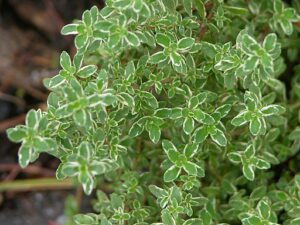
Photo (c)2006 Derek Ramsey (Ram-Man), CC BY-SA 2.5, via Wikimedia Commons
Thyme is an herb that has been used medicinally for centuries.
Uses for Thyme:
1. Culinary: Thyme is commonly used as a culinary herb. It has a strong, aromatic flavor that goes well with many different dishes.
2. Medicinal: It has a long history of use in traditional medicine. It is thought to have numerous health benefits, including the treatment of respiratory problems, skin conditions, and digestive disorders.
3. Aromatherapy: The essential oil is often used in aromatherapy. Its strong, refreshing scent can help to boost energy levels and improve mood.
4. Insecticide: It can be used as a natural insecticide. Its strong aroma repels many different types of insects, including mosquitoes and flies.
Some of the health benefits of thyme include:
- a good source of vitamins A and C, as well as iron, manganese, and magnesium.
- can help to boost the immune system and fight off infection.
- has anti-inflammatory and antioxidant properties.
- can help to improve digestion and relieve gastrointestinal problems.
- can help to relieve respiratory problems such as bronchitis, coughing, and congestion.
- can be used topically to treat acne, eczema, and other skin conditions.
- essential oil can be used to treat anxiety, stress, and insomnia.
- can help to protect against various types of cancer.
- can help to lower blood pressure and improve circulation.
- can be used as a natural insecticide.
History:
The ancient Egyptians used it to embalm Pharaohs, and the Greeks and Romans used it as a disinfectant. It wasn’t until the Middle Ages that thyme began to be used as a culinary herb.
Today, it is still used medicinally, although its primary use is now as a culinary herb. Thyme is a versatile ingredient that can be used in many different dishes, from soups and stews to poultry and vegetables.
Active Constituents in Thyme:
Thymol is the primary active ingredient, and it is responsible for most of its medicinal properties. Thymol is an antiseptic and disinfectant that can be used to treat various respiratory problems, skin conditions, and digestive disorders.
Carvacrol is another active ingredient in it that has antibacterial, antifungal, and antiviral properties. Carvacrol can help to boost the immune system and fight off infection.
Terpenes are compounds that give it its characteristic aroma. They also have antimicrobial and anti-inflammatory properties.
Flavonoids are compounds that have antioxidant properties. They can help to protect cells from damage and reduce the risk of various diseases.
Phenolic acids are compounds that have anti-inflammatory and antimicrobial properties. They can also help to protect against various types of cancer.
Tannins are compounds that have astringent properties. They can help to treat diarrhea and other gastrointestinal problems.
Precautions for Using Thyme:
- It is generally safe for most people when taken in moderation. However, large amounts of thyme can be toxic.
- It can interact with certain medications, such as blood thinners and heart medication. Therefore, it is important to speak to a healthcare professional before taking it if you are taking any medication.
- The essential oil should not be taken internally. It can be toxic if ingested, nor should it be applied to the skin undiluted. It can cause irritation.
- Pregnant women should avoid taking it in large amounts, as it can stimulate contractions.
- It can cause an allergic reaction in some people. If you experience any symptoms of an allergic reaction, such as swelling, itching, or difficulty breathing, stop taking it and seek medical attention.
- Some people may experience gastrointestinal problems, such as nausea, vomiting, and diarrhea, after taking thyme. If you experience any of these symptoms, stop taking it and speak to a healthcare professional.
- It can make the skin more sensitive to sunlight. If you are taking thyme, it is important to use sunscreen and avoid prolonged sun exposure.
The Plant:
Thyme is a small, evergreen herb that belongs to the mint family. It is native to the Mediterranean region and has been used for culinary and medicinal purposes for centuries. Thyme is available fresh, dried, or as an essential oil.
Other similar herbs:
Herbs that are similar in benefit include basil, oregano, and rosemary. They share many of the same benefits, including the treatment of respiratory problems, skin conditions, and digestive disorders. They also have strong, aromatic flavors that make them ideal for use in cooking. Like thyme, these herbs can also be used as natural insecticides.
FAQ – Quick Overview
Q. What is the plant?
Thyme is a small, evergreen herb that belongs to the mint family. It is native to the Mediterranean region and has been used for culinary and medicinal purposes for centuries.
Q. What are the health benefits?
The herb is thought to have numerous health benefits, including the treatment of respiratory problems, skin conditions, and digestive disorders.
Q. How do I use it?
It can be used fresh, dried, or as an essential oil. It is commonly used as a culinary herb or for aromatherapy. Thyme can also be used as a natural insecticide.
Q. Are there any side effects or precautions?
It can interact with certain medications. Pregnant women should avoid taking thyme in large amounts. Thyme can also cause an allergic reaction in some people. Some people may experience gastrointestinal problems after taking thyme. Thyme can make the skin more sensitive to sunlight.
Q5. Where can I buy thyme?
Thyme is widely available in grocery stores and health food stores. It can also be purchased online.
